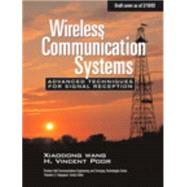
XIAODONG WANG, Assistant Professor in the Department of Electrical Engineering, ColumbiaUniversity, has done extensive research in wireless communications and signal processing. Hereceived the National Science Foundation Career Award and the IEEE Communications Society andInformation Theory Society Joint Paper Award.
H. VINCENT POOR, Professor of Electrical Engineeringat Princeton University, currently researches statistical signal processing applications inwireless communications. An IEEE Fellow and member of the National Academy of Engineering, he hasreceived the ASEE Frederick E. Terman Award, the IEEE Graduate Teaching Award, the NSF Director'sAward for Distinguished Teaching Scholars, and a Guggenheim Fellowship.
| Preface | |
| Introduction | |
| Motivation | |
| Wireless Signaling Environment | |
| Basic Receiver Signal Processing for Wireless | |
| Outline of the Book | |
| Blind Multiuser Detection | |
| Introduction | |
| Linear Receivers for Synchronous CDMA | |
| Blind Multiuser Detection: Direct Methods | |
| Blind Multiuser Detection: Subspace Methods | |
| Performance of Blind Multiuser Detectors | |
| Subspace Tracking Algorithms | |
| Blind Multiuser Detection in Multipath Channels | |
| Appendix | |
| Group-Blind Multiuser Detection | |
| Introduction | |
| Linear Group-Blind Multiuser Detection for Synchronous CDMA | |
| Performance of Group-Blind Multiuser Detectors | |
| Nonlinear Group-Blind Multiuser Detection for Synchronous CDMA | |
| Group-Blind Multiuser Detection in Multipath Channels | |
| Appendix | |
| Robust Multiuser Detection in Non-Gaussian Channels | |
| Introduction | |
| Multiuser Detection via Robust Regression | |
| Asymptotic Performance of Robust Multiuser Detection | |
| Implementation of Robust Multiuser Detectors | |
| Robust Blind Multiuser Detection | |
| Robust Multiuser Detection Based on Local Likelihood Search | |
| Robust Group-Blind Multiuser Detection | |
| Extension to Multipath Channels | |
| Robust Multiuser Detection in Stable Noise | |
| Appendix | |
| Space-Time Multiuser Detection | |
| Introduction | |
| Adaptive Array Processing in TDMA Systems | |
| Optimal Space-Time Multiuser Detection | |
| Linear Space-Time Multiuser Detection | |
| Adaptive Space-Time Multiuser Detection in Synchronous CDMA | |
| Adaptive Space-Time Multiuser Detection in Multipath CDMA | |
| Turbo Multiuser Detection | |
| Introduction to Turbo Processing | |
| MAP Decoding Algorithm for Convolutional Codes | |
| Turbo Multiuser Detection for Synchronous CDMA | |
| Turbo Multiuser Detection with Unknown Interferers | |
| Turbo Multiuser Detection in CDMA with Multipath Fading | |
| Turbo Multiuser Detection in CDMA with Turbo Coding | |
| Turbo Multiuser Detection in Space-Time Block-Coded Systems | |
| Turbo Multiuser Detection in Space-Time Trellis-Coded Systems | |
| Appendix | |
| Narrowband Interference Suppression | |
| Introduction | |
| Linear Predictive Techniques | |
| Nonlinear Predictive Techniques | |
| Code-Aided Techniques | |
| Performance Comparisons of NBI Suppression Techniques | |
| Near.Far Resistance to Both NBI and MAI by Linear MMSE Detector | |
| Adaptive Linear MMSE NBI Suppression | |
| Maximum-Likelihood Code-Aided Method | |
| Appendix: Convergence of the RLS Linear MMSE Detector | |
| Monte Carlo Bayesian Signal Processing | |
| Introduction | |
| Bayesian Signal Processing | |
| Markov Chain Monte Carlo Signal Processing | |
| Bayesian Multiuser Detection via MCMC | |
| Sequential Monte Carlo Signal Processing | |
| Blind Adaptive Equalization of MIMO Channels via SMC | |
| Appendix | |
| Signal Processing For Fading Channels | |
| Introduction | |
| Statistical Modeling of Multipath Fading Channels | |
| Coherent Detection in Fading Channels Based on the EM Algorithm | |
| Decision-Feedback Differential Detection in Fading Channels | |
| Adaptive SMC Receivers for Flat-Fading Channels | |
| Appendix | |
| Advanced Signal Processing for Coded OFDM Systems | |
| Introduction | |
| OFDM Communication System | |
| Blind MCMC Receiver for Coded OFDM with Frequency-Selective Fading and Frequency Offset | |
| Pilot-Symbol-Aided Turbo Receiver for Space-Time Block-Coded OFDM Systems | |
| LDPC-Based Space-Time Coded OFDM Systems | |
| Appendix | |
| Acronyms | |
| Bibliography | |
| Index | |
| Table of Contents provided by Publisher. All Rights Reserved. |
The New copy of this book will include any supplemental materials advertised. Please check the title of the book to determine if it should include any access cards, study guides, lab manuals, CDs, etc.
The Used, Rental and eBook copies of this book are not guaranteed to include any supplemental materials. Typically, only the book itself is included. This is true even if the title states it includes any access cards, study guides, lab manuals, CDs, etc.